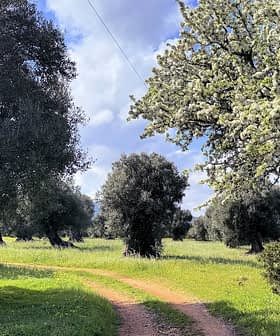The municipality of Rome is joining the Italian network, Città dell’Olio, an association that includes more than 400 olive-growing municipalities in Italy.
According to officials in the Italian capital, the initiative will promote olive oil culture and olive oil tourism to offer new opportunities to local producers, farmhouses and tourist venues.
(This decision) will also encourage social agriculture and the introduction of good practices, which are innovative and sustainable.
“This should not come as a surprise since Rome, and olive oil are historically connected by a vocation and a millennial-long history,” Sabrina Alfonsi, Rome’s secretary of agriculture, environment and waste management, told Olive Oil Times.
“Olive oil has been one of the pillars of the Roman economy since the 7th Century BCE,” she added.
See Also:Value of PDO and PGI Olive Oil Production Drops in ItalyThe announcement comes on the heels of several initiatives from the recent nation-wide oleotourism law which offers olive growers and farmhouses new opportunities to broaden the scope of their activities.
Officials said joining Città dell’Olio is a step toward their new food policy approach, which is partially based on the so-called Fusilli initiative.
According to a statement, Fusilli aims to achieve an “integrated and safe holistic transition toward healthy, sustainable, secure, inclusive and cost-efficient food systems” in line with the European Union’s Food 2030 policy, which is focused on healthy and sustainable diets and the sustainability and efficiency of the food systems.
“The connection to these roots aims to enhance this fundamental food of the Mediterranean diet as an engine of economic and tourist development of our municipality,” Alfonsi said.
“Today, our city is experimenting with the production and the commercialization of local quality extra virgin olive oil produced both in our agricultural estate in [the nearby town of] Castel di Guido and in the 189 olive trees present in the archeological park of the Colosseum,” she added.
The extra virgin olive oil produced in the Colosseum archeological area on Palatine Hill is now known as Palatino extra virgin olive oil. It is part of a project to recover and understand the complex relationship developed through the ages between human settlements and vegetation.
“When Ancient Rome’s expansion reached this area, the marshes around the hill were reclaimed, and the richest families began building their villas and planting their orchards on the top of it,” Gabriella Strano, the landscape architect of the Colosseum Archeological Park, told Olive Oil Times in a May 2021 interview.
Recently, the European Union recognized the Olio di Roma PGI, a new Protected Geographical Indication that includes all five provinces of the Lazio region, and an annual production of about 10,500 tons.
There are also four pre-existing extra virgin olive oil Protected Designation of Origin (PDO) areas in the region, which city officials said will gain further visibility due to the renewed connection with the ancient Italian capital.
When the PGI was debated in 2018, the National Olive Growers’ Consortium and its allies argued that it would devalue producers in the four PDO regions.
A PDO certification indicates that an extra virgin olive oil’s properties are determined by its geographical location and natural and human factors.
A PGI certification, on the other hand, indicates that at least one part of the process takes place in the designated area. As a result, the latter tends to cover a broader swath of territory than the former.
“The recognition of the Olio di Roma PGI by the E.U. does not overlap with territories, such as Tuscia and Sabina, which have always produced excellent olive oil but rather provides them if they wish, an umbrella, represented by the Roma brand, which could offer them advantages, especially for exports,” Alfonsi said.
North of Rome, in the northwestern quadrant of Lazio, most producers are members of the Canino PDO consortium, which is known for the local Canino variety grown in the land of the Torlonia family, an ancient Roman family.
Other than Canino, local PDO producers grow Leccino, Pendolino, Frantoio and Maurino olives.
Frantoio, Canino and Leccino are also the main cultivars of Tuscia PDO extra virgin olive oil production in the northeastern quadrant of Lazio.
To the east of the Italian capital, Sabina PDO producers grow Carboncella, Leccino, Raja, Pendolino, Moraiolo, Frantoio, Olivastrone, Salviana and Olivago e Rosciola olives.
South of Rome, in the Colline Pontine PDO area, producers specialize in the Itrana, Frantoio and Leccino varieties.
In a statement, Città dell’Olio celebrated Rome’s decision to join the association as “historic” and said it would help “combat the abandonment of olive groves and agricultural lands and promote olive oil tourism and the local experiences connected to extra virgin olive oil.”
“It will also encourage social agriculture and the introduction of good practices, which are innovative and sustainable,” they added.
“I do believe that the olive oil sector might constitute a relevant development for our city,” Alfonsi concluded.









